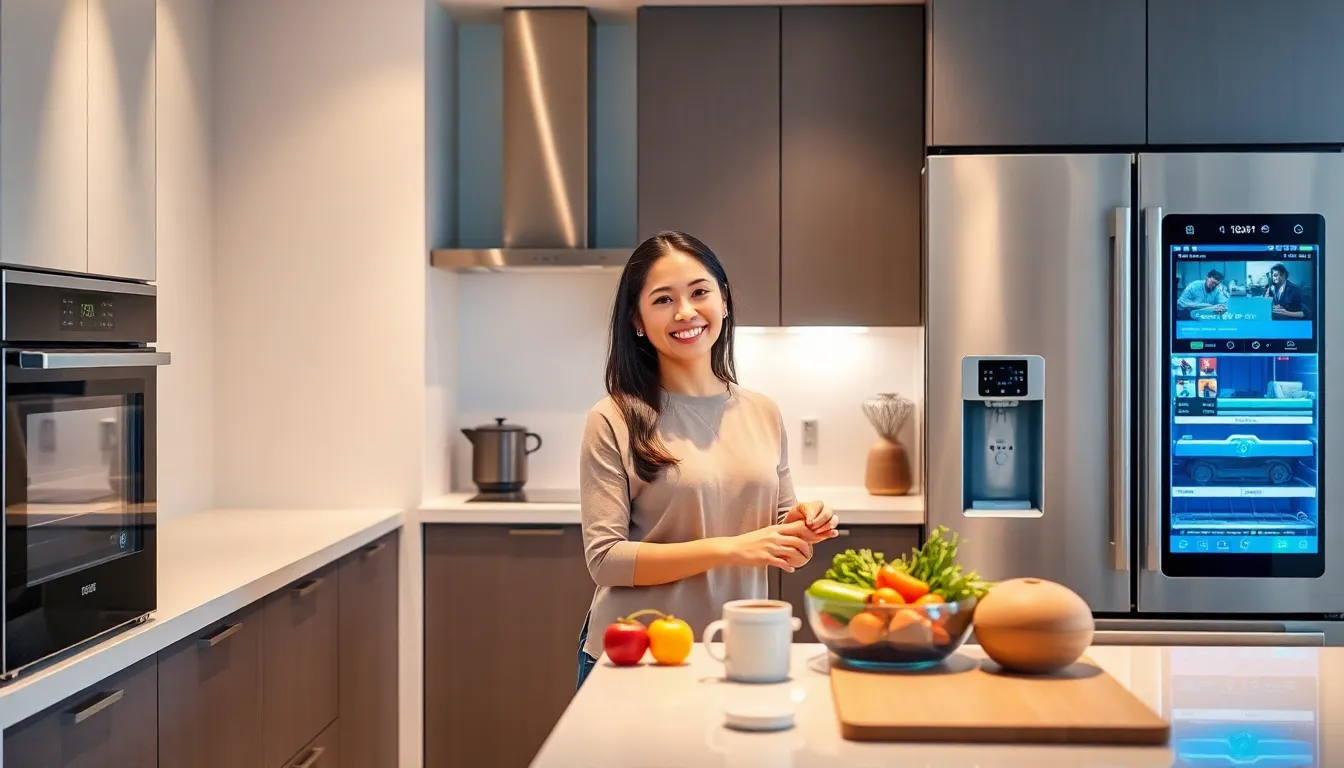Imagine stepping into your kitchen and having it greet you like an old friend. With smart kitchens, that dream’s become a reality. These high-tech havens transform mundane cooking tasks into a seamless dance of convenience and efficiency. From voice-activated assistants that can whip up a recipe to smart ovens that know just how to bake your cookies to perfection, the future of cooking is here, and it’s ready to impress.
Gone are the days of fumbling with timers and guessing ingredient measurements. Smart kitchens offer a delightful blend of technology and culinary creativity that makes even the most novice chef feel like a pro. So why not embrace this culinary revolution? After all, who wouldn’t want a kitchen that does the thinking while they focus on perfecting their soufflé? Buckle up; it’s time to explore the wonders of smart kitchens and discover how they can elevate everyday cooking into a gourmet experience.
Table of Contents
ToggleOverview of Smart Kitchens
Smart kitchens integrate advanced technology to enhance culinary experiences. They transform traditional cooking into efficient, enjoyable tasks.
Definition and Concept
A smart kitchen includes appliances and devices that connect to the Internet. Smart fridges monitor inventory and suggest recipes based on available ingredients. Voice-activated assistants control smart ovens and provide cooking tips. Sensors in appliances ensure precision in cooking temperatures and timings. Each device communicates seamlessly, offering convenience and efficiency. Automation allows for hands-free meal preparation.
Importance in Modern Living
Smart kitchens address the fast-paced lifestyle of contemporary households. They save time by automating tasks and streamlining meal preparation. Efficiency in cooking leads to less food waste, proving beneficial for both families and the environment. Healthier cooking options become more accessible with guided meal plans and nutritional information. Enhanced safety features reduce risks associated with traditional cooking methods. Integration with smart home systems creates a harmonious living environment, improving overall quality of life.
Key Features of Smart Kitchens

Smart kitchens incorporate several advanced features that streamline the culinary experience. Notable functionalities enhance convenience and efficiency for modern cooking.
Smart Appliances
Smart appliances are essential in a smart kitchen environment. Devices such as refrigerators monitor food inventory and suggest recipes based on available ingredients. Smart ovens allow users to control cooking processes remotely, ensuring precision in temperature and time. Microwaves equipped with sensor technology adjust cooking times automatically. These appliances not only increase efficiency but also reduce the risk of overcooking or burning meals.
Connectivity and Integration
Connectivity plays a crucial role in smart kitchens. Internet-connected devices communicate seamlessly with each other through smart home systems. Integration with voice-activated assistants offers hands-free management of cooking tasks. Homeowners can easily set timers, search for recipes, or control appliances through simple voice commands. Enhanced connectivity promotes a cohesive kitchen environment, fostering a seamless transition between meal planning and preparation.
Benefits of Smart Kitchens
Smart kitchens offer numerous advantages that transform meal preparation and enhance overall cooking experiences.
Convenience and Efficiency
Convenience defines smart kitchens, where technology simplifies tasks. Voice commands allow users to control appliances hands-free. Smart fridges monitor inventory and suggest recipes based on available ingredients. Cooking times and temperatures can adjust automatically in smart ovens, ensuring perfectly cooked meals. Meal planning becomes effortless when integrated apps sync with calendar events, reminding users of what’s needed. Scheduling appliances for later use optimizes time management during busy days. Devices can even send alerts when meals are ready, reducing the chance of overcooking.
Energy Savings
Energy savings serve as a crucial benefit of smart kitchens. Smart appliances optimize usage by monitoring energy consumption in real time. Many devices allow users to track energy use through mobile apps, promoting more efficient habits. For example, smart thermostats adjust cooking environments based on user activity, reducing unnecessary heating and cooling. Energy-efficient settings on ovens and dishwashers minimize utility bills while still delivering excellent performance. Additionally, smart lighting systems can minimize energy waste by automatically turning off when no one is present in the kitchen. This approach contributes to both environmental sustainability and cost savings.
Challenges and Considerations
Smart kitchens offer numerous benefits, but several challenges and considerations also come into play.
Cost and Affordability
Upfront costs for smart kitchen appliances can be significant. Many advanced devices are priced higher than traditional counterparts. Even so, long-term savings from energy efficiency and reduced food waste may balance initial investment. Homeowners ought to evaluate their budgets based on appliance lifespan and potential savings. Additionally, financing options and rebates could ease the financial burden for some consumers. Shopping around can help identify affordable solutions and systems tailored to specific needs. Overall, it’s crucial to weigh both costs and benefits.
Security and Privacy Concerns
Data privacy remains a primary issue in smart kitchens. Devices often collect user data to enhance functionality, but this raises concerns about potential breaches. Internet-connected appliances may expose personal information if not adequately secured. Users must regularly update software to protect against vulnerabilities. Moreover, individuals ought to assess the privacy policies of manufacturers to understand data usage. Implementing network security measures, such as strong passwords and secure Wi-Fi connections, creates a safer environment. Ensuring privacy requires vigilance and proactive management from homeowners.
Future Trends in Smart Kitchens
Innovation continues to shape the future of smart kitchens. Advancements aim to enhance efficiency and create a more personalized cooking experience.
Innovations on the Horizon
Augmented reality may soon allow users to visualize recipes directly in their kitchens. Smart mirrors could display cooking tutorials or nutritional information while meals are being prepared. Meanwhile, artificial intelligence is expected to further improve inventory management, analyzing food usage patterns and suggesting optimal purchase schedules. Robotics may play a larger role, with automated cooking assistants taking on specific tasks. Finally, integration with health apps could lead to personalized meal recommendations based on dietary restrictions.
Sustainability Efforts
Eco-friendly appliances are gaining traction, prioritizing energy efficiency and reducing waste. Smart refrigerators often monitor food expiry dates, minimizing spoilage and encouraging users to use ingredients efficiently. Some devices connect to local grocery stores to facilitate delivery of sustainable products. Homeowners can expect smart kitchens to integrate composting and recycling reminders, promoting a green mindset. Furthermore, increased reliance on renewable energy sources for appliance operation aligns with sustainability goals, showcasing a commitment to environmental stewardship in cooking spaces.
Smart kitchens are revolutionizing how people approach cooking and meal preparation. By integrating advanced technology with everyday tasks, they create a more efficient and enjoyable culinary experience. The convenience of smart appliances not only saves time but also promotes healthier cooking habits and reduces food waste.
As technology continues to evolve, smart kitchens are likely to become even more intuitive and personalized. Homeowners can look forward to innovations that enhance safety, sustainability, and overall quality of life. Embracing this trend means stepping into a future where cooking becomes a creative and seamless process, making every meal an opportunity for exploration and enjoyment.







